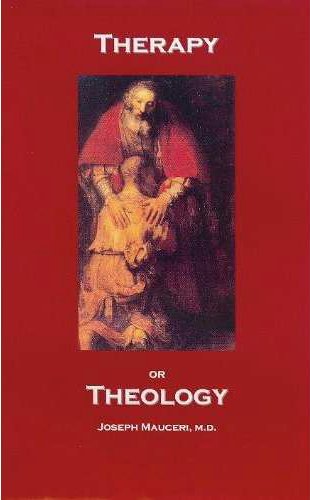Catholic Medical Quarterly Volume 62(3) August 2012 page 43
Book review
Therapy or Theology?
Joseph Mauceri MD,
Cephas
Institute
ISBN 0-9626257-8-7
 In
the introduction to this excellent study, there is mention of
Bertha Pappenheimer, a patient who was in search of meaning.
Unfortunately for her, her therapist was Sigmund Freud and he
was merely in search of a theory. The atheist Freud did not
believe in the existence of the soul, instead believing that
science would reduce the emotions to chemical imbalances in the
brain. Thus, according to Freud, our emotions lack metaphysical
meaning. The incredible mystery that IS each person eluded him.
In
the introduction to this excellent study, there is mention of
Bertha Pappenheimer, a patient who was in search of meaning.
Unfortunately for her, her therapist was Sigmund Freud and he
was merely in search of a theory. The atheist Freud did not
believe in the existence of the soul, instead believing that
science would reduce the emotions to chemical imbalances in the
brain. Thus, according to Freud, our emotions lack metaphysical
meaning. The incredible mystery that IS each person eluded him.
In contrast, Dr Mauceri believes that even the most common psychological problems such as anxiety needs to be perceived as something mysterious and which has a direct bearing on the spiritual condition of the person. In other words, the doctor must believe in the soul. After many years of clinical experience, Dr Mauceri has concluded that anxiety is itself a symptom of a deeper struggle and often relates to a fear of death.
Dr Mauceri is rightly critical of the superficialities of New Age spiritualities as well as "undirected" psychotherapy. The latter refers to the humanistic psychology of Carl Rogers and colleagues that has had such a negative impact within the Church. Dr Mauceri is equally critical of behaviour therapy which rejects free will and so the existence of a moral order.
The section on the philosopher Nietzsche states that "The great diagnostician of the nihilistic age was himself a man plunged into the abyss of mental illness in his last years... He saw the destruction coming where others saw progress."
The nihilism which Nietzsche foresaw is really the death of meaning. The meaningless individualism we hear proclaimed widely today (one thinks of the slogan "my body, my choice") is a direct consequence of this nihilism. Without meaning, there is dread and anxiety. Dr Mauceri argues that only the Judeo-Christian world view can deal coherently with the problems of dread, suffering and evil.
So the ultimate choice is God or nihilism. The source of consolation for mankind is not therapy but the healing truths of religion. Dr Mauceri writes that "We are genetically religious, and all men seek to worship something. " Only a strong faith grounded in truth, love, reason and psychological maturity prepares us to "go forth in courage and prudence."
Dr Mauceri holds a balanced view on the use of medication in the management of anxiety. There is a place for its appropriate use but ethical problems ensue when drugs are used to alleviate feelings of guilt. Guilt should not be dismissed as something inherently bad for when confronted appropriately it leads to healing and maturity.
The problem with psychotherapy is not there is too much of it but there is not enough of the right sort. This is a book that I will be returning to again and again.
REVIEWED BY DR PRAVIN THEVATHASAN
